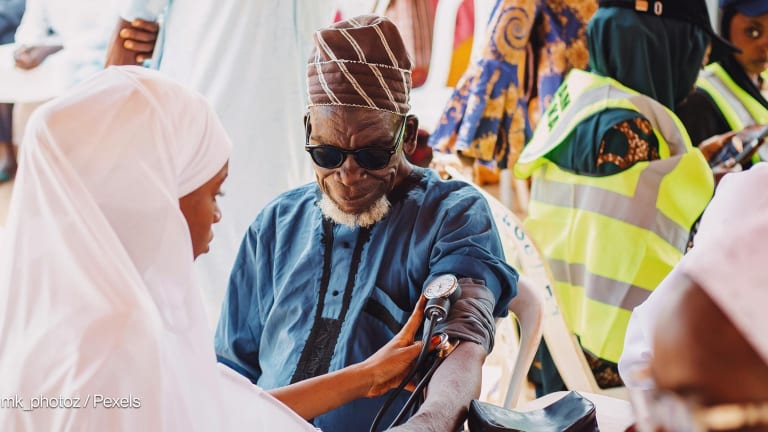
SAN FRANCISCO — A new initiative wants to draw attention to organizations that are reaching more than 1 million people living on less than $5 a day.
Alexis Bonnell, chief innovation officer at the U.S. Agency for International Development, announced the launch of the Million Lives Club on Tuesday at the Social Capital Markets conference in San Francisco.
The effort, led by USAID and partners including donor agencies from Canada, United Kingdom, and Australia, seeks to help social enterprises achieving meaningful scale attract the support they need to grow and even partner with bilateral donors.
Two myths often come up in conversations with donors looking for interventions that might accelerate their work in international development, Bonnell told an audience of social entrepreneurs and impact investors at the conference.
“The first is that nothing is scaling. The second is that there are no investible deals out there,” she said. “And I have to admit I bought into that for a while.”
More on social enterprise
► The Fourth Sector Group wants to transform the future of business
► Social impact incentives? A new tool for supporting impact
► How social entrepreneurs are using technology to accelerate change
But after learning about organizations that were achieving real impact at scale, through her own work at USAID as well as conversations with peers involved in the International Development Innovation Alliance and Global Innovation Exchange, she wanted to change the narrative.
She unveiled the first cohort of 44 members and explained that applications will be accepted on a rolling basis, with an upcoming deadline of Jan. 10 and new additions every six months.
VisionSpring, which works to ensure affordable access to eyeglasses, was selected as a member of the Million Lives Club, and CEO Ella Gudwin said it has the promise to serve as a platform for social entrepreneurs and donor agencies to learn from one another.
“When the dynamic reflects fewer tin cups and purse strings, and great solidarity — with all of us standing shoulder to shoulder to solve a problem, each with unique perspectives, assets, and capabilities to offer — that is when great things can happen,” she said in an email to Devex.
Gudwin said the Million Lives Club also has the potential to surface investment opportunities for new philanthropists who are looking for proven interventions.
Initially, the idea was that organizations would have to reach 1 million people with their interventions to qualify for the Million Lives Club. But Australia’s Department of Foreign Affairs and Trade made the point that in small island nations, those numbers may not be possible, and instead the scale of innovation can be measured by the percentage of the population reached. Other donors agreed and worked together to broaden the criteria.
As a result, 31 “vanguard” members were recognized for affecting more than a million clients with their innovations, 8 “voyager” members were included because their innovations are expected to reach more than 1 million clients within 18 months, and 5 “pioneer” members were recognized because they have scaled to meet the needs of more than 40% of their target populations.
This expanded definition of scale was a welcome development for Liz Diebold, principal at the Skoll Foundation, a private foundation based in California and a partner in the Million Lives Club.
“We are keen to see less countable or directly attributable solutions added to the group,” she said.
While more than half of the Skoll Foundation portfolio fits the criteria for the Million Lives Club, some of the most effective organizations do not measure their impact by number of people reached, Diebold said.
“What we’re really trying to incentivize is more social entrepreneurs being customer-centric, delivering great value — pushing people along that journey to self-reliance — and we wanted to make sure people saw the path and that it was a journey not a destination,” Bonnell said.
Bridge International Academies, which runs networks of schools in Kenya, Liberia, Nigeria, Uganda, and India, is another vanguard member of the Million Lives Club.
“A good yardstick for success will be if this platform helps to embed social enterprises, who are already evidenced as delivering successfully at scale, into the strategic planning and frameworks of funders and governments,” said Femi Awopetu, director of external affairs for Bridge in Nigeria.
By highlighting the track record of these social enterprises, the Million Lives Club could also help these social enterprises see further recognition, support, and expansion, he said.
Bonnell said one of her goals with the Million Lives Club is to explore how more of these social enterprises could present new ways for USAID to do its work in development. The procurement reform the agency has undertaken is a step in the right direction toward working with social enterprises, she said. But Bonnell also acknowledged that USAID could do more to make it easier for these organizations to partner with USAID.
“Our hope is the Million Lives Club will be one step of making our missions and our bureaus aware of these really great organizations delivering value and increasing our appetite to figure out how they can further fit in our structure,” she said.








